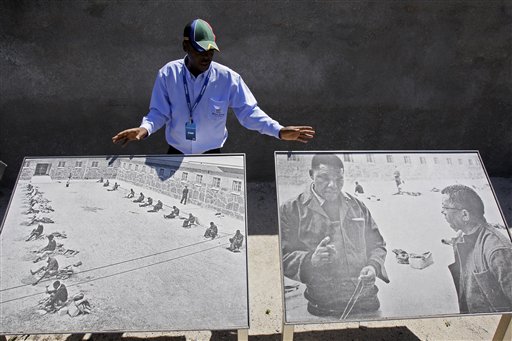Today I met a great football man. Easily done, you might think, in the city that is about to host the World Cup draw; the place must be swarming with Beckenbauers, Platinis and Beckhams.
And so it is.
But the man I have in mind is far from a household name and played most of his matches not in the cathedrals of the sport, but on a prison pitch of weeds and rutted sand.
His name is Anthony, or Tony, Suze.
Nowadays a sturdy and opinionated 60-something, Suze was once the leading light of Manong Football Club, long the dominant force in the remarkable Makana Football Association, which sprang up in the 1960s on Robben Island, the notorious prison near Cape Town where Nelson Mandela and other opponents of apartheid were incarcerated.
This afternoon Suze escorted me and a party of other journalists around the facility he still refers to as “my first home”.
Highlight of the tour, of course, was the small, scruffy pitch where inmates were eventually allowed to start playing matches three years after first claiming the right to do so.
Standing beside this pitch, Suze explains how they used fishing-nets in the goals, patiently unpicking them to serve as a line when they needed to draw the onfield markings, then putting the net back together again when they had finished.
“The guys in the isolation cells could watch through their windows and we could send each other messages,” says Suze, who spent 15 years as a prisoner.
“I was notorious,” he says, when I ask why he had been sent to Robben Island.
“[I was] instigating people to overthrow the South African Government.
“I didn’t do anything particularly horrendous, except talk too much.”
On the football field, Suze - who retains an astonishingly upbeat outlook on life, given his experiences – says he played both defence and on the wing; but “I scored a lot of goals wherever I played”.
Among his opponents was one Jacob Zuma, South Africa’s current President.
Suze remembers the future leader as “a staunch defender”.
He attributes football with developing the organisational skills of the prisoners.
“We were allowed to play for only 15 minutes every Saturday and there were about 2,000 prisoners,” he says.
“So immediately the situation forced us to get organised.
“When we decided to form clubs, we did it [on the basis of] political organisations.
“But I said I was in favour of clubs forming spontaneously.
“So Manong was actually formed outside [the realm of] political interference.”

When I ask how the prisoners found strength for regular football matches given the gruelling and tedious regime of labour they were forced to undertake, he says that after a while, they learnt how to “conserve energy”.
“You got to learn how to drop the wheelbarrow without the warder noticing.”
He then gives the most pithily poetic explanation of the effect something as simple as a ball can have on the human spirit that I believe I have ever heard.
“When you are playing, you are not a prisoner.
“We transcended our environment, our situation through soccer.”
Football was not the sole sporting release for the Robben Island inmates.
Outside one of the cell-blocks, Suze announces: “We developed what we called the Summer Olympics.”
There were four sports – athletics, football, rugby and even tennis, played on a court built of cement foraged from the floor of the prison’s cement storage house.
Did you present gold medals, I ask?
“We gave out certificates.”
He explains how those on cleaning duty were organised to clear out one or other of the long 90-man cells in which inmates used to sleep on particular days, so that football training could take place there.
In an illustration of the futility and frustrations of prison life at Robben Island, Suze tells the story of how sandals were not allowed inside the cells, but were left outside in a big pile at the end of each day.
This meant that, inevitably, many men would end up with the wrong size sandals, or even two left feet, the following day.
Those in this position would carry the ill-fitting sandals around their neck until trades with other inmates could be arranged to give everyone the footwear they needed.
Unfortunately, “when you finally have the two shoes that fit you, it is time to come back here and drop them outside the door again,” Suze recalls.
It is testament to his strength of character that he can now recount this tale without apparent bitterness.
Asked if he attends football matches now, Suze says that “I hate crowds” and found the crush at an Orlando Pirates v Kaizer Chiefs match where he was carried 10 or 11 feet without his feet touching the ground “horrific”.
He says he is “chuffed” that South Africa is staging next year’s World Cup and will go to watch “if those FIFA guys give us tickets”.
“I’m going to take them to task,” he adds.
“Where are the tickets, Mister FIFA?”
Come on, Mister FIFA: it is the least Suze and other authors of this remarkable football story deserve.
Contact the writer of this story at zib.l1745857971labto1745857971ofdlr1745857971owedi1745857971sni@n1745857971ewo.d1745857971ivad1745857971.
David Owen is a specialist sports journalist who worked for 20 years for the Financial Times in the United States, Canada, France and the UK. He ended his FT career as sports editor after the 2006 World Cup and is now freelancing, including covering last year’s Beijing Olympics. An archive of Owen’s material may be found by Twitter users at www.twitter.com/dodo938.
.jpg)